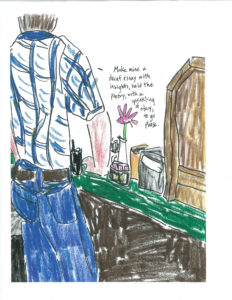“ To eat lambs quarters,” murmurs one friend to another, “pick them when they’re small then add them to your omelet. They are little triangular leaves of surprise.” Surprise like unexpected syllables wafting between tables on a Friday morning. The piquant flavors of overlapping conversations at the coffeehouse can add zest to sipping and nibbling of latté, scone or bagel. Even words that are less dainty add flavor. “Crappy elevator music … it makes me crazy,” says the woman in a corner whose handbag sprawls on the extra chair, wide open as if it is gagging on the woman’s attitude. Her coat in a lump on the table looks like a dead animal.
To eat lambs quarters,” murmurs one friend to another, “pick them when they’re small then add them to your omelet. They are little triangular leaves of surprise.” Surprise like unexpected syllables wafting between tables on a Friday morning. The piquant flavors of overlapping conversations at the coffeehouse can add zest to sipping and nibbling of latté, scone or bagel. Even words that are less dainty add flavor. “Crappy elevator music … it makes me crazy,” says the woman in a corner whose handbag sprawls on the extra chair, wide open as if it is gagging on the woman’s attitude. Her coat in a lump on the table looks like a dead animal.
Indifferent to all except the bare neck of the beauty across the table from him, a lean young man in worn Patagonia plaid lowers his head closer to two coffee mugs and says, “I want to utter you.” Maybe he’s heard the line in a recent song, maybe it just popped into his head, but clearly he is hoping the syllables will help him keep the attention of the young woman he’s corralled for the morning. She looks confused. “Utter?” A word not loud like a moan but with more presence than a gasp. Or has he said “udder.” Sitting around in a public place bores her and trying to make sense of poetic conversation is annoying before breakfast; she’d rather they were doing something, anything, together. She’d even say yes to him showing her Walnut Canyon to be rid of these inert hours. How might she strangle his settled-in slump against the wall? Suggest rock climbing? Picking up litter? The coffee is good, but hanging out is so BORING.
A different voice derails her train of thought. “Can you trust someone who lives with 100 sunflowers surrounding his house?” There is always one voice at the table of university professors—all men—that trumpets a stray sentence over the ebb and flow of syllables earnest and casual, laughter tweaked and opinion strangled. A man leans back and his certainty swells into strident tones capable of inflating a large classroom with Truth. The background subtext today is, “We will not be fooled.” The local fact is this: one of them lives next to a house where giant sunflowers have been growing an inch a day through late summer into fall. Not just five or six peering over a back fence. Not just 20 or 30, but an exuberant, surging gallery of sunflowers like too many heads in an overbooked required course on day one. The man shakes his head to indicate this is many more flowers than seems reasonable.
“I counted 100,” says Professor A, and lays his large hand down on the The New York Times as if to introduce evidence emphatically.
“Coincidence,” says Professor B. “Random chance, the even number of them.”
“Art making?” says Professor C.
“Where do they get the time?”
“Why sunflowers?”
“Have you read E.O. Wilson, a huge intellect?” The murmuring of the professors changes tone to support the introduction of idea wedded to cogent point making; familiar tones soothe the knot of heads as a busy busboy brushes the backs of shoulders between tables, bending to clear and deftly balance cups. Tourists pause to study the menu on a chalkboard. Full sunlight laces into departure jokes by one of a trio of real estate agents who will be in Copenhagen next Friday, unable to attend breakfast as usual. Remarks are made about how unappealing travel is lately.
A man’s chair scrapes as he pushes back to leave, but not without final comment. “It makes me see yellow everywhere,” Professor A says. “Living next door to 100 sunflowers, I’ve started walking around the block just to have the surprise of gray driveways and brown front doors.” He picks up the newspaper and realizes he’s read it and sets it down again with a small thunk. “Red shiny new cars and green metal roofs, and then yellow. All that yellow moving in slow motion. I swear some of those fat seed heads have expressions.”
The others nod at his departure. “You know they’re figuring out prairie dogs are more like us,” Professor B remarks. “Family groups. Elaborate communication systems.” They have discussed and figured out department empire building, a gap between the local economy and current urban planning theory, and the pros and cons of transportation systems embodied by Portland versus Phoenix. And now the conversation is stalled in a gap between sunflowers and prairie dogs.
The sunshine creeps across the table as if it is being sucked back through the window, more comfortable with street life than conversational gambits.
Finally someone says, “I don’t know anything about mushrooms, do you?”
In a coffeehouse in the town surrounded by pine trees, oak groves and ferns, words ooze up and out of the muck of the coffee worshippers. Meanwhile in the forest, small round beings push through the layers of duff, presenting an unexplored diversity of colors and shapes just waiting for the attention of university professors.
“Must be a book somewhere,” Professor C says. “About safe mushrooms.”
A bored young woman sniffs where she has paused outside to read notices stapled to a wooden post. “What about Rogers Lake?” she asks the fellow at her elbow. “Is it really a lake?” A grumpy woman rearranges her bag in the crook of her elbow and scowls as she shields her eyes before crossing the street; she’s forgotten to get small bills to feed the machine at the laundromat. Down the street two walkers pause and peer down, wondering if there are lambs quarters along the Rio de Flag, and would they be any good to eat, green growth so close to city pavement.
Arizona-born Jean Rukkila is a retired fire lookout who writes from coffee houses, camp sites and libraries. See more of her writing at www.flagstaffletterfromhome.com.

